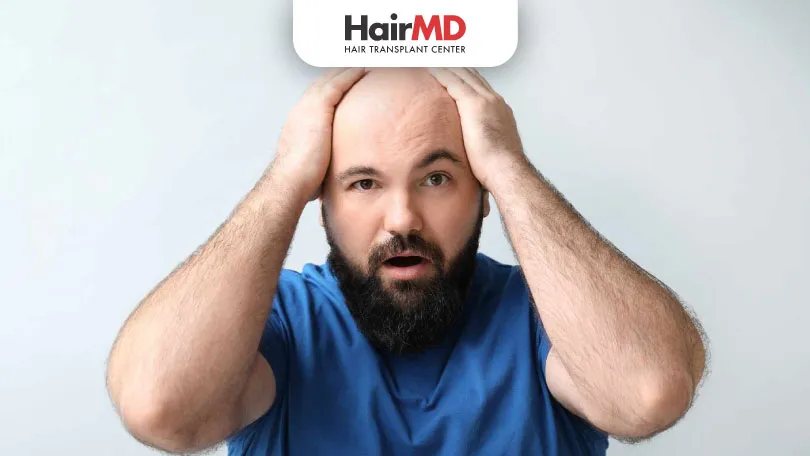31st July, 2023

What’s covered in the article?
- What is Hair Loss?
- What is obesity?
- Is there a Relationship Between Obesity and Hair Loss?
- Conclusion
What is Hair Loss?
Shedding around 50-100 strands each day is part of the natural hair growth cycle comprising three phases; growth, rest, and fall. However, when the fall count goes up to 150 strands per day, it is called hair loss. Many factors can distort the natural cycle and lead to excessive hair loss with no signs of regrowth. In some cases treating the cause can revert hair loss, while in some others, damage can be permanent.
What is Obesity?
Obesity is a condition where an individual is overweight for his height. You can find out if you are obese by calculating your BMI or body mass index by dividing weight in kilograms by the square of height in cms. A BMI below 18.5 is considered underweight, between 18.5-24.9 is considered normal, between 25-29.9 is considered overweight, and above 30 falls under obesity.
Is there a Relationship Between Obesity and Hair Loss?

There is no direct relationship between hair loss and obesity. However, the lifestyle choices of an obese person can indirectly lead to hair loss. Below are the causes that may lead to hair loss and must be looked into:
- Improper Diet
Obesity leads to cravings, and you start eating anything that tastes good. Consumption of sugary drinks and fried food reduces the intake of nutrients in the body, which causes hair loss. You must take care of what you eat and focus on taking a balanced diet for proper hair growth.
- Stress
Obesity causes stress which can cause chronic hair loss. Stress management activities like yoga, exercise, meditation, and doing something else you like can help you manage stress and can prevent hair loss.
- Inactivity
Hair loss due to obesity might arise due to inactivity and imbalanced hormones. Managing body weight by being physically active will help balance hormones and overall health.
If you are suffering from hair loss due to an improper lifestyle, then it’s time to change it. If the hair fall is excessive, get your appointment with an expert dermatologist immediately.
Protein is the building block of the human body. Despite aiding in the vital functioning of the body, it also helps in non-vital functions like hair growth. Hair is a fibrous filament made up of protein and emerges from the deeper layers of the skin from hair follicles. Hair loss is becoming a common problem nowadays. Keep reading to know more about obesity and hair loss.
Shedding around 50-100 strands each day is part of the natural hair growth cycle comprising three phases; growth, rest, and fall. However, when the fall count goes up to 150 strands per day, it is called hair loss. Many factors can distort the natural cycle and lead to excessive hair loss with no signs of regrowth. In some cases treating the cause can revert hair loss, while in some others, damage can be permanent.
There is no direct relationship between hair loss and obesity. However, the lifestyle choices of an obese person can indirectly lead to hair loss. Below are the causes that may lead to hair loss and must be looked into:
- Improper Diet
Obesity leads to cravings, and you start eating anything that tastes good. Consumption of sugary drinks and fried food reduces the intake of nutrients in the body, which causes hair loss. You must take care of what you eat and focus on taking a balanced diet for proper hair growth.
- Stress
Obesity causes stress which can cause chronic hair loss. Stress management activities like yoga, exercise, meditation, and doing something else you like can help you manage stress and can prevent hair loss.
- Inactivity
Hair loss due to obesity might arise due to inactivity and imbalanced hormones. Managing body weight by being physically active will help balance hormones and overall health.
Do You Know?
Nearly 250 Patients Visit HairMD
Everyday For Various Hair Concerns?
(You are one click away from flawless skin)
Meet Our Dermatologists
Conclusion
Further Reading
Itchy Scalp and Hair Loss: Causes, Treatments, and Prevention
Itchy scalp and hair loss can be troubling, hinting at deeper scalp and hair health issues. Discover the connection in this comprehensive guide.
Dandruff Fungus Treatment
Learn how dandruff and fungus impact scalp health. With HairMD, you can get expert advice on causes, treatments, and prevention tips to maintain a healthy, flake-free scalp.
Helmet Use and Hair Loss: What You Need to Know
Does wearing a helmet cause hair loss? Understand the connection, debunk myths, and explore preventive tips with expert insights from HairMD.
Top Causes of Hair Loss in Women and How to Address Them
Discover the key causes of hair loss in women, including hormonal changes, stress, and nutritional deficiencies. Learn effective solutions and treatments with HairMD experts.
Have thoughts? Please let us know
We are committed not only to treating you, but also educating you.











